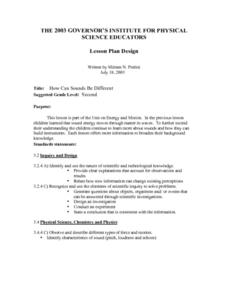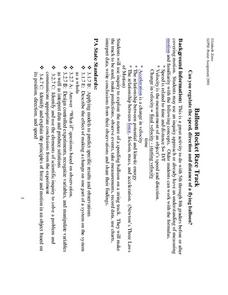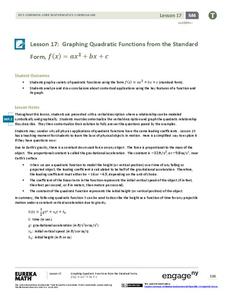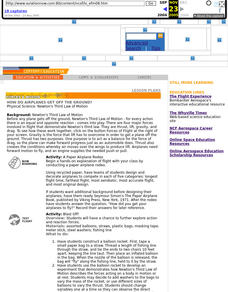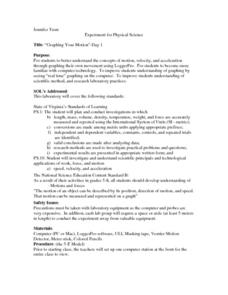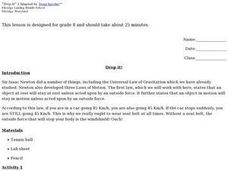Curated OER
How Can Sounds Be Different
Second graders explore energy and motion. They investigate how sound energy moves in waves. Students explore how sounds are varied and how the instruments that make those sounds are built. They observe sounds being produced and predict...
Curated OER
Catch the Pollution
Explore environmental care by conducting a pollution experiment. You'll discuss the causes of pollution in our environment and what the overall impact will be if we can't change our ways. Clear plastic tape, a can, and compass are used...
Curated OER
Balloon Rocket Race Track
Students discuss "How can we measure (or make it easier to record) the speed, distance or acceleration of the balloon?" They told that they are going to make a balloon racetrack. Pupils use meter sticks to accurately measure length and...
Curated OER
The Basics: Physical Science
Learners view a video on friction and examine how friction and gravity affect some sports. In this investigative instructional activity students write a paragraph and draw a picture that illustrates how friction and gravity affect...
Curated OER
The Science of Hurricanes
Learners explore hurricanes. In this science lesson, students discuss the aspects of hurricanes and watch videos of hurricanes. Learners discuss the motion of the hurricanes.
Curated OER
Roll On
Second graders, in groups, develop models to show how forces such as gravity, friction, equal, unequal forces and change in direction work on marbles.
Curated OER
Pendulum Patterns
Students identify the variables involved in the motion of a pendulum. In groups, they research how each different variable is related to the energy the pendulum produces. They share their results with the class and compare them with...
Curated OER
What Structural Challenges Do Bridge Builders Face Today?
Students investigate the process of constructing a bridge. They study the meaning of structural force and draw pictures of examples. Students identify the types of building materials have been used in history to construct bridges and how...
Physics Classroom
Action-Reaction Lab
Computer-interfaced motion detectors are required to carry out this inquiry. It is a new twist on exploring motion with plunger carts: they are set back-to-back and then propelled away from each other. Their velocities are measured, and...
Curated OER
Sports and Science
Using footballs, basketballs, tennis balls, and more, learners conduct experiments to illustrate Newton's Laws of Motion. The experiments are conducted outside, and require them to throw, kick, and hit a variety of balls. Your...
PHET
Mapping the Ambient Magnetic Field
No GPS allowed! High school scientists continue to explore magnetic fields with a hands-on activity. After mapping the ambient magnetic field in the classroom and completing data analysis, they write about the similarities and...
PHET
Earth’s Magnetic Field from Space
Feel the pull of science! The final installment of this 18-part series is an application of everything learned in the previous high school lessons. Scholars are given a magnetic field map and must propose an arrangement of magnets that...
University of Colorado
Happy Landings: A Splash or a Splat?
Huygens spacecraft landed on Saturn's moon Titan in 2005, making it the farthest landing from Earth ever made by a spacecraft. In this hands-on activity, the 12th installment of 22, groups explore how density affects speed. To do this,...
EngageNY
Graphing Quadratic Functions from the Standard Form
Use context to explain the importance of the key features of a graph. When context is introduced, the domain and range have meaning, which enhances understanding. Pupils use application questions to explore the key features of the graph...
Curated OER
Cold, Clouds, and Snowflakes
Students explore satellite data and graphing. In this weather data analysis math and science lesson, students analyze NASA satellite data to draw conclusions about geographical areas where precipitation might have happened. Students...
Institute of Electrical and Electronics Engineers
Blast Off!
With the use of a model rocket kit, aspiring aerospace engineers work cooperatively to construct and launch a rocket. A preparatory reading assignment is included, covering Newton's laws of motion and information about the first...
Curated OER
Energy At Play
If you can find Tinker Toys™, then this may be a fun assignment for your physical science class. Using the construction set and a few other toys, they examine the forces involved when it they are being played with. For each, they...
Berkeley Engineering and Mentors
Marshmallow Catapaults
After a brief lecture on levers, torque, projectiles, and the five-step engineering design cycle, young physical science learners or engineers build catapults out of craft sticks. This is an open-ended exploration of what works and what...
Curated OER
How Do Airplanes Get Off the Ground
Students construct various types of paper airplanes, exploring action and reaction forces by conducting a paper airplane rodeo. Students then discuss how Newton's Third Law of Motion affected their planes.
Curated OER
Graphing Your Motion-Day 1
Ninth graders explore the concepts of motion, velocity and acceleration through graphing their own movement using LoggerPro. They become more familiar with the computer technology. Students explore graphing in real time and graph on...
Curated OER
Drop It!
Eighth graders explore Newton's Law of Motion that states that an object at rest stay at rest unless acted upon by an outside force and that an object in motion stay in motion unless acted upon by an outside force.
Curated OER
Newton's Third Law
Students use inquiry and observation to explore Newton's third law of motion: for every action there is a reaction. In this physics lesson, students rotate through six stations set up with materials and picture directions illustrating an...
Curated OER
VECTORS
Ninth graders explore vectors. In this vectors lesson students complete a lab activity.
Curated OER
Swinging on a String
Students explore how pendulums work and why they are useful in everyday applications. In a hands-on activity, they experiment with string length, pendulum weight and angle of release.
